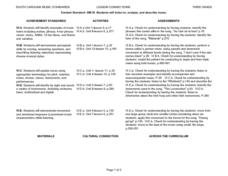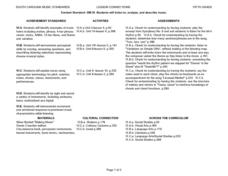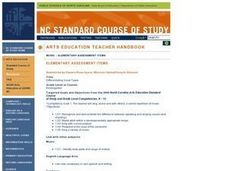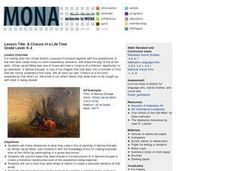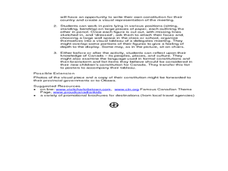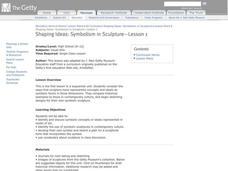Curated OER
Music: Individual and Group Practice
Third graders, in groups and individually, perform various musical pieces on their instruments. After demonstrating how to play steady beats, they also play counter melodies to songs such as "Peace Like a River." While some students...
Curated OER
Listen to Music
Young scholars listen to, analyze, and describe music. They identify examples of music forms including such as motive phhrase, 4-bar phrase,
canon, and rondo. In addition, they perform a dance called a partner mixer and model the pattern...
Curated OER
Manipulating Sound
Students use music software to create and refine a musical composition. They use music software to create a sequence of musical phrases. Students use music software to create and refine a musical composition and adapt it in the light...
Curated OER
Describing Music
Fifth graders listen to the 9th symphony and identify the tiri-ti rhythm. They identify the number of times they hear a phrase "turn, turn, turn". They then describe the meaning of one song and answer questions in class discussion.
Curated OER
Ceramics: A Vessel into History
High schoolers create a personal clay vessel that has a specific use or meaning in their contemporary culture, which could be discerned through study by future archeologists and art historians.
Curated OER
Differentiating Vocal Types
Students sing, alone and with others, a varied repertoire of music. State competency at the kindergarten level is stressed for this lesson. Assessment is based upon in-class performances and individual work.
Curated OER
Cardiovascular Disease and Fitness: Exploring the Rhythm of Your Pulse
Students explore several examples of cardiovascular diseases. In this anatomy lesson, students explain why physical fitness is very important. They count their pulse rate and record them on a data table.
Curated OER
Patterned Leaf Cloths
Students identify and reproduce simple patterns (e.g., red blocks alternating with blue blocks; clap-clap-stamp) and create and extend simple patterns using a variety of materials or actions (e.g., popsicle sticks, pebbles, stickers,...
Curated OER
Changing Images of Childhood in America: Colonial, Federal and Modern England
Students compare and contrast maps of New Haven, Connecticut from today and the past. After taking a field trip, they draw sketches of the types of architecture and discuss how the buildings have changed over time. They read journal...
Curated OER
A Chance of a Life Time
Students view and discuss the painting A Narrow Escape, by Alfred Jacob Miller. They write their own narrative about a time they were either scared or frightened. They make sketches of that time and choose one to paint using watercolor.
Curated OER
Hoosier Artists
Students examine the paintings of various Indiana artists. Using the internet, they relate the landscapes shown to the history of the state and how it affected Native Americans. Using the information they gathered, they write story...
Curated OER
The Story Behind the Horse
Students view and interpret Dan Howard's artwork entitled, Soliloquium:IV. They write a story of what they think is behind the painting and then paint their own soliloquy.
Curated OER
Urban Concentration and Racial Violence
Students research one of the many urban race riots in U.S. history, from the New York City riots during the Civil War to the "Red Summer of 1919" or the hate-strikes of 1943. They present their findings in the form of a newspaper's front...
Curated OER
Dango
Students discuss lines, shapes, patterns, and colors used in Jun Kaneko's piece Untitled (Dango). In groups, they help make a paper Mache replica and demonstrate their understanding of lines, shapes patterns, and colors by painting their...
Curated OER
Where Canada Began
Third graders discuss the term "Birthplace of Confederation" in context to the beginnings of Canada. In groups, they create a list of the rights and responsibilities of citizens and identify examples of those who made contributions to...
Curated OER
Ceramics: A Vessel into History
High schoolers evaluate the works of their peers using criteria for value and meaning.
Curated OER
Parts of a Whole
Fourth graders explore fractions through the analysis of various paintings. They view and discuss paintings by Picasso and Seurat, discuss the fractional examples in the paintings, and create a bar graph.
Curated OER
Romare Bearden and the Face Collage
Fourth graders create a collage from magazines and newspapers to create a face. After finishing the face, they use mixed media to complete the background. They write their own description and examine the life and works of Romare Beardon.
Curated OER
Shaping Ideas: Symbolism in Sculpture
High schoolers participate in a class critique of the symbolic sculptures they created. They critique the work of their peers by responding to questions about the symbolic content and applying criteria for sculpture.
Curated OER
Still-Life Painting: Arranging Nature Lesson 3
Students identify and analyze the characteristics of European still-life paintings. They paint still-life arrangements using various opaque medium techniques.
Curated OER
Shaping Ideas: Symbolism in Sculpture
Students consider the ways that sculptors have represented concepts and ideals as symbolic forms in three dimensions. They compare historical examples to those in contemporary culture, and begin sketching designs for their own symbolic...
Curated OER
Shaping Ideas: Symbolism in Sculpture
Students use criteria developed in class to evaluate which of their own sketches would make the best symbolic sculpture. They choose a final design, techniques and materials, and create sculptures based on their designs.
Curated OER
Oregon Trail Landforms
Fourth graders explore landforms located along the Oregon Trail. They discuss the significance of the Oregon Trail, identify visual landforms, and explain the definition of each one. Students complete worksheets, color, and label maps.
Curated OER
Ceramics: A Vessel into History
Young scholars produce a ceramic vessel based on elements derived from historical examples.



